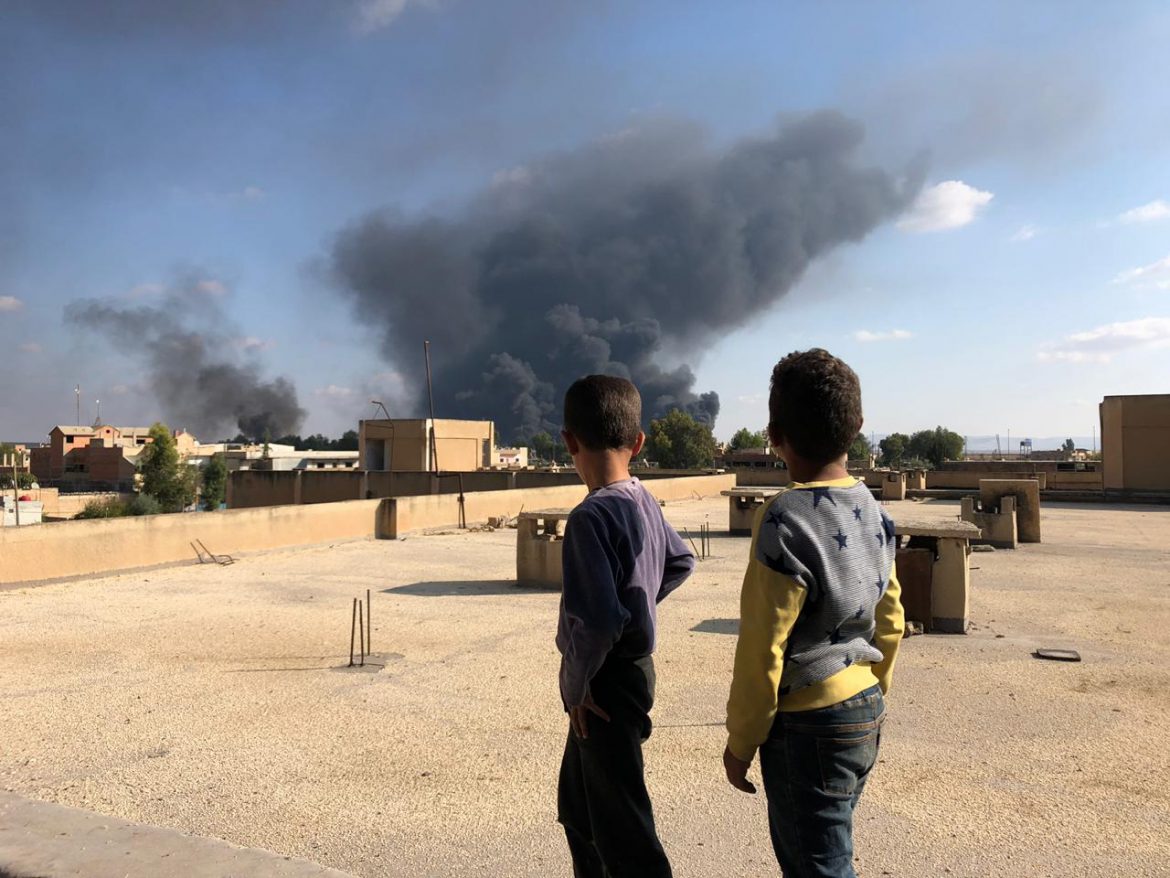Washington Kurdish Institute
November 2, 2020
A year ago, Turkey’s authoritarian President Recep Tayyip Erdogan launched his second major military campaign against the Kurdish population of Syria with the publicly-stated aim of ethnically cleansing the region. Turkey’s first major military operation in Syria was the invasion of the Afrin region in January 2018, an act of aggression that was, for the most part, ignored by the US media and political establishment. This invasion killed thousands and displaced over 150,000 civilians from the once peaceful area. However, following US President Trump’s phone call with Erdogan in October 2019,the Turkish military and its jihadist proxy groups launched another unprovoked invasion of northern Syria, taking aim at the US-backed Syrian Democratic Forces (SDF), who had just recently eliminated the so-called caliphate of the Islamic State (ISIS) terrorist organization, under the pretext of the SDF’s alleged links to the Kurdistan Workers’ Party (PKK). The PKK has been fighting the Turkish state for the rights of the Kurdish people for decades, and is listed as a terrorist organization by Turkey, the US, and the European Union (EU). These false claims by Erdogan and his ultra-nationalist coalition partners were to justify a campaign to eliminate Kurdish presence in northern Syria, just as was being done in Afrin. As a result of this second, even larger scale Turkish military invasion, over 300,000 Kurds and other Syrians were displaced, and many of their homes were repopulated with Syrians from other parts of the country, including Turkish-backed jihadist fighters and their families.
America had seemingly lost interest in the region, and certainly ceded a great deal of influence. With the drawdown of American presence, Russia eagerly expanded its presence in Syria, as did the Assad regime. At the same time, Iranian-backed militias enjoyed greater freedom of movement, and ISIS terrorists were resurgent, despite periodic US airstrikes. Despite a partial reversal of the US decision to withdrawal, it remains unclear for how the small numbers of US troops will remain in Syria.
A recent intensification in the Turkish military bombardment of the Kurdish region make plan Erdogan’s intentions to continue his campaign of ethnic cleansing against the Kurds of Syria, with his most recent threats coming just last Wednesday. Erdogan has a track record of using foreign military adventures to shift the focus of Turkey’s citizens whenever the country’s dire economic enters a new crisis. Furthermore, whenever he seems to be losing popularity inside Turkey, Erodgan looks to create issues abroad. For example, since the Turkish invasion in 2019, Erdogan has openly directed Turkish military and political intervention into Libya, the Eastern Mediterranean, Iraq, and Armenia. In addition, he attempts to expand Turkey’s roles in Somalia, Lebanon, and Yemen. By using various tactics to boost Islamic and nationalist sentiments abroad, Erdogan has, to some degree, been successful in drawing the attention of at least some of Turkish public to these issues, but sooner or later many of Turkey’s citizens tire of foreign quagmires and economic misfortune, and realize that Turkey is rapidly losing friends in the international arena.
Erdogan knows that the upcoming presidential elections have dominated almost every aspect of life in the US, and the foreign policy is the least concern of most Americans at the moment. Most likely, whether or not President Trump is reelected, Erdogan would prefer to launch another invasion during the current time of distraction, and while Trump still has just over two and a half months in office.
The bad news for the Kurds is that there are many reasons why Erdogan could be successful in launching another attack on the Kurds of Syria. First, Erdogan’s personal relationship with President Trump has been essential – the US could certainly have prevented this invasion of areas formerly under their American influence, while the other major powerbroker in Syria, Russia, was certain to have no problem with such aggression. President Trump could easily allow another invasion by Erdogan, having spoken many times about the need to reduce American military presence abroad. Second, it is true Erdogan was able to sell his interventions to the Turkish population, though he failed to achieve much. For example, in Libya, Erdogan is slowly being sidelined by the international community as his main proxy has already resigned. A similar story has unfolded in the Eastern Mediterranean when a coalition of all neighboring states and the EU has stopped Turkey from making any further provocative moves and exploring natural resources near the Greek islands. In Armenia, Russian jets have downed Turkish drones in response to Erdogan’s active support for Azerbaijan’s dictator in the Nagorno-Karabakh conflict. Meanwhile, despite Erdogan’s frequent bluster against the EU, and most recently against France in particular, he will not be able to take too much of an aggressive stance due to Turkey’s dependence on the EU in various ways, including, most importantly, economic dependence.
Unfortunately, the Kurds remain very vulnerable to Erdogan’s aggression, and are always convenient card to be played when Erdogan wants to rally support and distract the masses within Turkey. Erdogan’s Islamist-nationalist coalition government controls almost the entire media establishment in the country, and fans the flames of hatred toward Kurds, especially during military campaigns. At the same time, Russia, the chief foreign backer of the Assad regime, has not offered the Kurds any options other than surrender to the regime in Damascus, which generally means a slower death for the Kurds versus a more rapid death at the hands of the Turkish military if another invasion occurs. In addition, there is speculation that Russia may have made a bargain with Turkey, discussion the exchange of Idlib for the Kurdish region. Unless the US maintains its small but extremely effective military presence Syria, one year after the most recent Turkish invasion, the situation of the Kurdish-led administration and millions of civilians currently enjoying relative stability under this administration will be uncertain, with more pain and suffering on the horizon.

